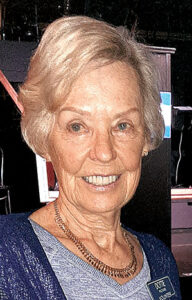Guest Commentary | There is hope for adults living with mental illness

Mental illness runs in his family. Matthew’s own personal nightmare began with a diagnosis of bipolar schizoaffective disorder in 2014 at age 29. Up until then, Matthew was rapidly climbing the ladder of success at an extremely popular social media company. Loss of his cognitive ability made work impossible. All his dreams for the future were shattered, having seen what mental illness did to other family members.
Prior to his diagnosis, Matthew had an amazing group of friends and a loving family. Those friends no longer answered the phone. His family could not cope with or understand his illness and distanced themselves. He was desperate for help and ended up in and out of doctor’s offices, mental institutions, rehab wilderness programs, and endless prescriptions for medications.
No longer a popular, charming, and very successful person, Matthew became homeless and a burden to everyone he knew. Having grown up in an upper middle-class household, poverty and living on the streets were foreign to him. He saw drugs, prostitution, crime, and people dying. His first thought each morning was how he was going to eat that day, often begging strangers for food, even rummaging through garbage cans for something of value he could sell for money. Constant hunger plagued him. Life became a game of survival. Paranoia became relentless. He had endless panic attacks. Delusions that something terrible was going to happen filled his mind 24/7. The trauma of staying safe on the streets led to a diagnosis of Complex PTSD in 2018.
Dealing with fear, anxiety, shame, humiliation, tons of medical debt, maxed out credit cards, unstable living conditions, bouncing from motel to motel, abandoned houses, halfway houses, and institutions became the norm. Life became a game of survival, literally hell on earth with drugs, death, and poverty. He hated going to sleep at night because he would just have to wake up and do it all over again the next day. His meager belongings became his everything. If you see homeless people pushing shopping carts full of trash, understand that the cart and contents are all they have. Most homeless people living on the streets, in tent cities, and under bridges have a mental illness. Mentally stable people do not live in these locations. They just don’t.
For Matthew, his illness felt like the complete destruction of a human being. For illness such as his, there are treatments, but currently no cure.
His path is not atypical. The mental health system is broken, and the recovery system is barbaric and predatory. Mental hospitals are too often run like low-level security prisons. They are revolving doors that see the same people every couple of weeks.
Fortunately for Matthew, he found Hope Clubhouse of Southwest Florida in Fort Myers, a non-profit community of support for adults who have had their lives drastically disrupted by mental illness. The Clubhouse provides opportunities for paid employment, access to education, housing, and psychiatric services. He became a member in 2023. For the first time since his diagnosis, he learned it was okay to be mentally ill. Living on the streets for so many years, Matthew was unaccustomed to the attention, respect, and compassion he received at the Clubhouse. He was not a burden. People respected his boundaries and his voice was heard. This kind treatment was foreign to him. He had been treated as a pariah for so long, yet at the Clubhouse he was made to feel that adults with mental illness are useful people.
Mental illness makes adult orphans, and Hope Clubhouse is often the only family and friend some members have. Today, as Matthew continues to heal, he has Hope Clubhouse to remind him he has a name and a place where he is cherished, appreciated, and feels safe. He is grateful to the Clubhouse for saving his life.
There are currently 326 Clubhouses in the United States. Contact Clubhouse International for a Clubhouse near you.
Dottie Pacharis is a Mental Health Advocate and author of “Mind on the Run, A Bipolar Chronicle,” a book about her son’s 13-year struggle with bipolar disorder. She is a Board Emeritus and Volunteer at Hope Clubhouse in Fort Myers.
To reach DOTTIE PACHARIS, please email news@breezenewspapers.com

